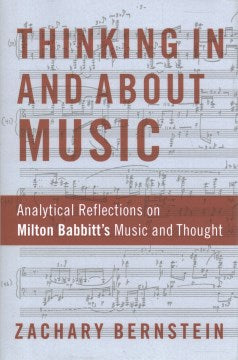
Thinking in and About Music
Publisher,Oxford Univ Pr
Publication Date,
Format, Hardcover
Weight, 612.35 g
No. of Pages, 299
Milton Babbitt (1916-2011) was, at once, one of the century's foremost composers and a founder of American music theory. These two aspects of his creative life-thinking in" and "thinking about" music, as he would put it-nourished each other. Theory andanalysis inspired fresh compositional ideas, and compositional concerns focused theoretical and analytical inquiry. Accordingly, this book undertakes an excavation of the sources of his theorizing as a guide to analysis of his music. Babbitt's idiosyncratic synthesis of ideas from Heinrich Schenker, analytic philosophy, and cognitive science-at least as much as more obviously relevant, and more frequently cited, predecessors such as Arnold Schoenberg-provide insight into his aesthetics and compositional technique. Examination of Babbitt's newly available sketch materials sheds additional light on his procedures. But a close look at his music reveals a host of concerns unaccounted for in his theories, some of which seem to directly contradict theoretical expectations. New analytical models are needed to complement those suggested by Babbitt's theories. Departing from the serial logic of Babbitt's writings, his compositional procedures, and most previous work on the subject-and in an attempt to discuss Babbitt's music as it is actually heard rather than just deciphered-the book brings to bear theories of gesture and embodiment, rhetoric, text setting, and temporality. The result is a richly multi-faceted look at one of the twentieth century's most fascinating musical minds"--

